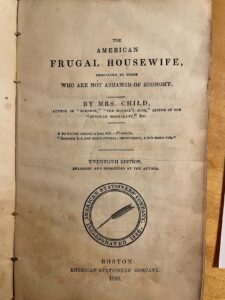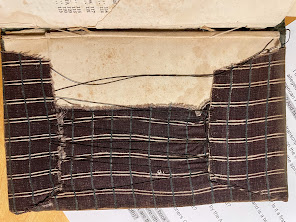Lydia Maria Child was a known author and editor, a Native American Rights and Women’s Rights activist, and abolitionist, with published works about slavery and race; she also authored The Frugal American Housewife. Many of her published works are on topics of race, slavery, and rights, including her work An Appeal in Favor of that Class of Americans Called Africans. She received backlash for publishing the piece, leading her to step down as editor to her children’s magazine The Juvenile Miscellany, though she continued to publish works for and about marginalized societal groups (“Lydia Maria Child,” 1). Some of Child’s other works include The Freedmen’s Book and The Mother’s Book (Poetry Foundation, 1). She married David L. Child, an abolitionist and editor, who was also an abolitionist (“Lydia Maria Child,” 1). Some of her other projects are highlighted on the title page of The American Frugal Housewife (See Figure 1).

Figure 1
The book was printed at the American Stationers’ Company in 1836. This company opened the same year and closed two years later in 1838 (Firms Out of Business, 2). An interesting observation to note is the fourth edition copy I was able to look at was also published in Boston in 1831 but by a different company, Carter, Hendee & Babcock, which underscores how popular this book was, with multiple publishers needed to meet demand. The American Stationers’ Company published other known authors including Nathanial Hawthorne (Christie’s, 1) and informational texts like Atlases (Digital Public Library of America, 1). The Frugal American Housewife was a popular guidebook; therefore, when looking at other texts the American Stationers’ Company had published, it is not unique that they would take interest in Child’s book. Not much is known about the company and why it closed two years after its opening. Further research using the Gale Literature Dictionary of Literary Biography failed to find a reason for the company’s closure, but it confirmed the publishing of some previously mentioned titles. It is interesting that this publishing company went out of business, even with selling a popular book in circulation at the time during their first year of business. My guess is the company may have simply lost business and had plummeting profits, as there is no mention of a merger with another publishing company. In general, I could not find much information about the company other than their published titles.
After speaking with Dickinson College Archivist Malinda Triller-Doran, I concluded the book is printed on rag-based paper. Pulp-based paper became popular after the publication of this book in the mid-1800s. There is no evident pulp in the paper, and it has not grown brittle with age. Pulp-based paper is more likely to be worn with age as it is cheaper than cloth-based. The publisher made the binding for early copies of the book published in Boston. The binding was made up of boards (compressed cardboard) with blue paper over them (“The Frugal Housewife : Dedicated to Those Who Are Not Ashamed of Economy,” 1). The eighth and twentieth editions I examined do not have blue paper covers but do have trace elements of paper left on their boards. The twentieth edition has what appears to be an added homemade cover; a patterned cloth sewn on with loose string and glued to the cover (See Figure 2). This decorative element was likely added on after the purchase of the book by a former owner of it.

Figure 2
The Frugal American Housewife’s publisher Carter, Hendee, & Co. published a variety of books in the 1830s, including other guidebooks and children’s books, like The Child’s Book of American Geography (“The Child’s Book of American Geography,” 1). They also printed works by notable people like John Quincy Adams (Adams, 1). I can assume that Lydia Maria Child did not have an agent as there is no one credited as such, and the first literary agency opened in the late 19th century in the United States, decades after this edition was published (Cottenet, 1). The only reference within the book to editing or corrections is on the title page, which says, “ENLARGED AND CORRECTED BY THE AUTHOR” (Figure 1), however this was likely a marketing tactic to sell newer editions. Child’s husband, David L. Child, was an editor and it is likely he also looked over his wife’s works (David Ruggles Center for History and Education, 1). No other editor is credited on the title page or anywhere else in the book.
The book has over thirty editions (accounts vary but there are between thirty-two and thirty-five) (“The Frugal Housewife,” 1). I was fortunate enough to look at both the twentieth and the eighth edition. One difference between the editions is that the former includes front matter that reads “It has become necessary to change the tit of this work to the ‘American Frugal Housewife,’ because there is an English work of the same name, not adapted to the wants of this country.” There was an English text titled The Frugal Housewife, or Complete Woman Cook by Susannah Carter published in the 18th century and focused primarily on cooking (Sotheby’s, 1). The American Frugal Housewife has cooking tips and recipes but also includes materials on etiquette, herbs, and remedies. The changes are significant in emphasizing different activities women participated in depending on the country; what American housewives were interested as opposed to what English housewives were interested in.
On the title page of this guidebook there are two Benjamin Franklin quotes: “A fat kitchen maketh a lean will” and “Economy is a poor man’s revenue; extravagance, a rich man’s ruin.” These two quotes set the tone of the book as it is filled with recipes, cooking tricks, and remedies. The book is meant for the working class and households without staff and serves as a guide to economically conscious household management. Using Benjamin Franklin, a United States Founding Father, quotes set the tone about how this book is tailored to Americans. This is also shown through the copyright distinction I mentioned previously. It emphasizes the importance of economy in daily life during the 1830s and how it influences the household.
Works Cited
Adams. “Dermot MacMorrogh, or the Conquest of Ireland; an Historical Tale of the Twelfth Century. in Four Cantos.” The Online Books Page, https://onlinebooks.library.upenn.edu/webbin/book/lookupid?key=ha008589426.
Christie’s. “HAWTHORNE, Nathaniel (1804-1864). Twice-Told Tales. Boston: American Stationers Co., 1837.” https://www.christies.com/en/lot/lot-5014582
Cottenet, Cécile. “Literary Agents.” Transatlantic Cultures, 1 Jan. 1970, https://transatlantic-cultures.org/en/catalog/agents-litteraires.
Digital Public Library of America. “Georgia. (to Accompany) A Comprehensive Atlas, Geographical, Historical & Commercial. By T.G. Bradford. Boston: American Stationers’ Company. Entered … 1835, by Thos. G. Bradford … Massachusetts., A Comprehensive Atlas, Geographical, Historical & Commercial. By T.G. Bradford. Boston: American Stationers’ Company. Entered … 1835, by Thos. G. Bradford … Massachusetts. (Title Page) Drawn by E. Tisdale, Landscapes by W. Croome. Eng. by J. Andrews., Georgia.” https://dp.la/item/06485f82ba58898b4f3c0dd69a5dd287
Firms Out of Business, 4 Mar. 2023,
https://norman.hrc.utexas.edu/Watch/fob_search_results_next.cfm? FOBFirmName=C&locSTARTROW=11
FOBFirmName=C&locSTARTROW=11 .
“Lydia Maria Child.” NATIONAL ABOLITION HALL OF FAME AND MUSEUM,
https://www.nationalabolitionhalloffameandmuseum.org/lydia-maria-child.html.
“Lydia Maria Child.” David Ruggles Center for History and Education, 10 Feb. 2021, https://davidrugglescenter.org/lydia-maria-child/#:~:text=American%20Literary%20Sensation&text=In%201828%2C%20Maria%20married%20David,family%20breadwinner%20throughout%20their%20marriage.
“Lydia Maria Child.” Poetry Foundation, Poetry Foundation, https://www.poetryfoundation.org/poets/lydia-maria-child.
Sotheby’s. “Carter, Susannah. The Frugal Housewife, or Complete Woman Cook…[Boston]: [1772].” https://www.sothebys.com/en/buy/auction/2020/fine-manuscript-and-printed-americana/carter-susannah-the-frugal-housewife-or-complete
“The Child’s Book of American Geography.” The Metropolitan Museum of Art, 1 Jan. 1970, https://www.metmuseum.org/art/collection/search/366571.
“The Frugal Housewife.” Andrews McMeel Publishing, 4 Mar. 2023, https://publishing.andrewsmcmeel.com/book/the-frugal-housewife/.
“The Frugal Housewife : Dedicated to Those Who Are Not Ashamed of Economy.” The Library of Congress, https://www.loc.gov/item/43019104/.
Leave a Reply